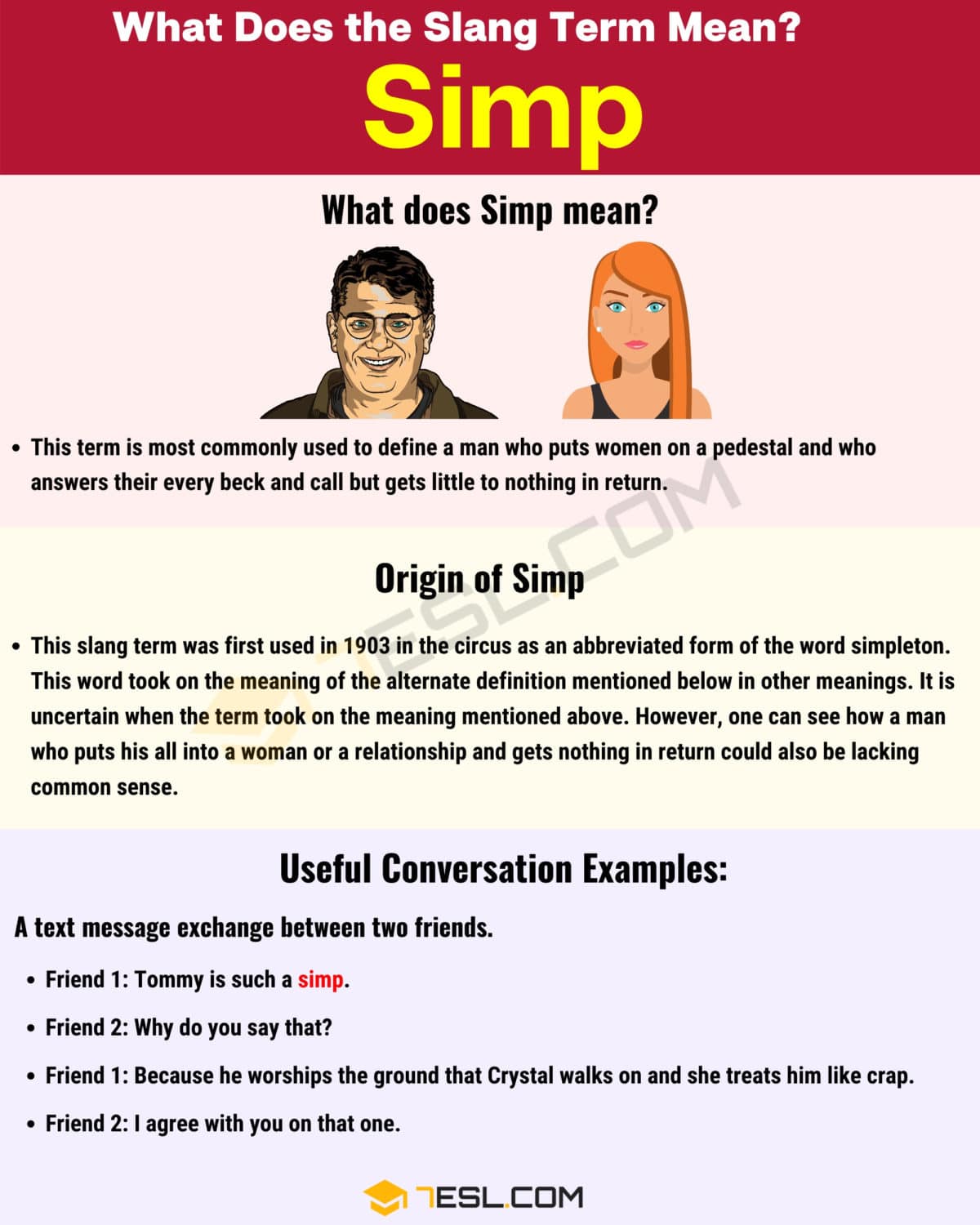Understanding "Simp": Definition, Usage & Impact | [Guide]
Is "simp" simply a modern insult, or does it reveal deeper anxieties about relationships and social dynamics in the digital age? The pervasive use of "simp" across the internet reflects a complex interplay of evolving social norms, gender expectations, and the impact of online platforms on how we perceive and navigate relationships.
The term "simp," a product of internet slang, has rapidly infiltrated mainstream conversations. Its core definition revolves around someone, typically a man, who excessively caters to another person, often a woman, in the hopes of gaining affection or a romantic or sexual relationship. The online landscape is awash with discussions, debates, and even defenses of the term, reflecting its multifaceted and often controversial nature. This article will delve into the origins, evolution, and societal implications of "simp," examining its impact on how we understand relationships, online behavior, and evolving gender dynamics.
The Evolution of a Slang Term
The etymology of "simp" is surprisingly layered. While it has gained significant traction in the past decade, its roots extend further back. According to the dictionary, its first recorded usage dates back to 1946, and evidence even suggests its presence in the New York Times as early as 1923. The term is derived from "simpleton," denoting a foolish or easily manipulated person. This initial definition provides a foundation for its current usage, although it has been significantly modified by the context of internet culture.
- The Jolson Story Fact Vs Fiction Ruby Keelers Role
- Papa Katsu Season 1 Info Synopsis Discussion Google Discover
The term gained traction on various online platforms, including social media, gaming communities, and streaming services. Its adoption by younger generations has cemented its place in everyday vernacular. The slang's popularity is undeniable, especially among adolescents, as evidenced by its widespread use on platforms like TikTok, Instagram, and Twitter. This popularity, however, brings with it a responsibility to understand its connotations and potential impact.
A critical aspect of "simp" is its application within the context of gender dynamics. It often targets men, implying they are overly eager to please women, frequently at their own expense, to achieve romantic or sexual success. The term is almost exclusively applied to men, which highlights the gendered nature of this evolving social phenomenon. The implications of this are significant, especially when considering the societal expectations placed on men and women in various cultures.
Decoding "Simp" in the Digital Age
Understanding the usage of "simp" requires an examination of how it is applied in online communication. "Simp" can be employed as an insult, a self-deprecating label, or even a form of commentary on perceived behavior. The nuance is key; the same word can express disapproval or be a tool for introspection, reflecting the complex and sometimes contradictory nature of online interactions. Its important to consider the context, the relationship between the communicators, and the tone in which the word is used.
- Breaking Fernando Amaya Charged In Fatal Shooting At 7500 Cook Road
- Decoding Macy Jones Story Social Justice Interests Discover Now
The rise of the "simp" can also be seen in conjunction with the growth of platforms like OnlyFans, where creators, often women, monetize their content. Critics argue that the focus on making fun of "simps" contributes to the exploitation and dismissal of those who may be struggling with feelings of loneliness, low self-esteem, or an unhealthy view of relationships. This criticism highlights the ethical considerations surrounding the use of the term and how it contributes to a complicated dynamic.
There is a clear link between the concept of "simps" and the rise of "incels" (involuntarily celibate) groups. The motivations of each group appear to be very different, even though the underlying intentions of both groups might be similar. The dynamic is a complex one, and the intersection between "simps" and "incels" is not always clear. Both groups appear to be dealing with the challenges of navigating social interactions, particularly with romantic and sexual relationships, in the digital age.
The use of "simp" is frequently associated with heterosexual relationships. It often targets men who appear to be overcompensating for the perceived lack of interest from a woman, though the underlying concepts can apply across the spectrum. The term's application highlights existing power dynamics and stereotypes related to dating and relationships. However, it is crucial to recognize that the dynamics of attraction and behavior can be complex and varied.
The Complexities of Online Interaction
The internet provides a unique lens through which to view human interaction, but it also amplifies certain behaviors and stereotypes. The "simp" phenomenon is a prime example of this. The instant access to information and the potential for anonymity allow for rapid judgments and the solidification of social labels. These labels can, in turn, affect individual behaviors and contribute to a climate of judgment.
The definition of "simp" itself doesn't explicitly assign a gender to the term. However, in practice, it is mostly directed towards men. This raises questions about societal expectations and the ways in which men are often pressured to pursue romantic relationships. Analyzing the language used and the behaviors considered "simp-like" offers important insights into broader societal patterns and norms.
The use of "simp" is often criticized because it undermines genuine connection. The potential for creating superficial relationships, or interactions driven by ulterior motives, can be a detrimental factor in online environments. In a digital landscape where authenticity is constantly questioned, the concept of a "simp" highlights these doubts about the sincerity and intentions behind online behavior. The term is often used to critique any behavior seen as an attempt to gain favor or a romantic relationship.
The use of this term also raises questions about the balance between self-expression and the potential for exploitation. The dynamics involved, particularly within communities like OnlyFans, demonstrate how the desire for validation can be exploited. The rise of "simp" culture exposes an array of challenges that stem from online platforms. It's imperative to navigate this dynamic and ensure healthy interactions, particularly for younger users.
Some argue the term "simp" can be a tool for men to express frustration with dating, society, and the pressure to conform to certain gender roles. By embracing the label, they can express their dissatisfaction with existing relationship dynamics. The self-deprecating use of the term also reflects the ability of internet communities to create self-awareness and use humor as a coping mechanism.
Beyond the Slang
The phenomenon of "simp" underscores larger issues related to societal norms and gender expectations. The widespread use of this term reflects how society perceives the role of men and women in romantic and social interactions. The focus on this single word may also divert attention from more profound issues like emotional manipulation, power dynamics, and the lack of healthy communication in digital spaces.
The term's impact on the self-esteem and mental health of those targeted is a major consideration. The constant ridicule can contribute to feelings of shame, inadequacy, and isolation. Society should be mindful of the possible impacts the use of such language has on individuals, especially vulnerable populations. Addressing mental health concerns, and combating a culture of negativity, is essential in promoting healthier interactions.
The popularity of "simp" reveals how online communities function. As online social ecosystems change, the social dynamics are constantly changing. The implications for how people understand social expectations, build relationships, and navigate their feelings are significant. The concept of "simp" demonstrates how language can be used to reflect, define, and shape those dynamics.
As technology and communication continue to evolve, the definition and the application of "simp" are also likely to change. Understanding the origins, the current uses, and the potential impacts can provide insights into this ever-evolving landscape. Understanding and discussing these shifts can help create healthier online environments and relationships.
The popularity of the term "simp" underscores larger societal trends. It reflects the ongoing need to address gender equality, promote healthy online communication, and explore the impact of internet culture on our social interactions. Navigating these developments effectively can provide valuable perspectives in the digital age. The future of how we communicate online depends on our ability to navigate the concept of "simp".
| Term | Definition | Origin | Modern Usage | Potential Impact |
|---|---|---|---|---|
| Simp | Someone who shows excessive sympathy and attention towards another person, typically in pursuit of affection or a sexual relationship. | Short for "simpleton". First known usage in 1946, though it appeared in the New York Times as early as 1923. | Used as a pejorative to describe someone, often a man, who is perceived as overly eager to please another person, typically a woman, in hopes of receiving romantic or sexual attention. | Can contribute to negative stereotypes, can have impact on self-esteem. Can be a tool for criticizing perceived power imbalances in relationships. |
| Incels | Involuntarily celibate individuals. | Derived from "involuntary celibacy". | A group often comprised of men who express feelings of resentment towards those they believe are sexually successful. | Linked to misogyny and violent ideologies. Raises concerns about online radicalization and the potential for offline harm. |
| OnlyFans | A content subscription service. | Launched in 2016. | A platform where creators, often women, monetize content. | Raises ethical considerations regarding exploitation and the commodification of relationships. Can also provide financial opportunities for creators. |
Reference: Urban Dictionary



Detail Author:
- Name : Hillary Wintheiser
- Username : johnston.calista
- Email : qkohler@yahoo.com
- Birthdate : 1997-03-31
- Address : 6770 Mireille Vista Suite 093 Port Griffinside, DC 33680-1824
- Phone : 1-225-251-3281
- Company : Towne PLC
- Job : Law Enforcement Teacher
- Bio : Exercitationem libero est tempora voluptas exercitationem. Cum aspernatur veritatis voluptatem ut fugit aliquid incidunt voluptatum. Quam quis rerum ullam tempore quae.
Socials
instagram:
- url : https://instagram.com/raud
- username : raud
- bio : Qui omnis voluptas nemo aliquid quia et. Facilis eligendi beatae consequuntur voluptatem quidem.
- followers : 1909
- following : 2543
facebook:
- url : https://facebook.com/delpha_rau
- username : delpha_rau
- bio : Repudiandae quasi rerum ullam dolorum dignissimos sequi sunt.
- followers : 2780
- following : 1138
linkedin:
- url : https://linkedin.com/in/delpha7868
- username : delpha7868
- bio : Explicabo et harum nesciunt quisquam.
- followers : 6407
- following : 2681
tiktok:
- url : https://tiktok.com/@delpha.rau
- username : delpha.rau
- bio : Omnis vero totam sit est reiciendis id corrupti.
- followers : 2570
- following : 1568
twitter:
- url : https://twitter.com/delpha_real
- username : delpha_real
- bio : Tempora qui sed fuga perspiciatis enim. Quisquam aut occaecati libero labore sit quos. Dolore similique blanditiis nesciunt repellendus asperiores.
- followers : 5492
- following : 2388